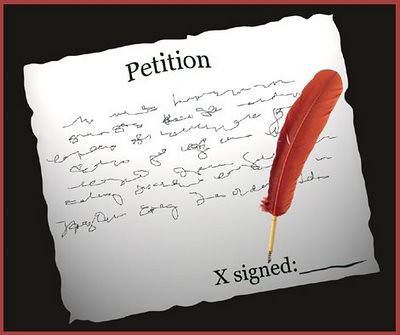From the Congressional Glossary – Including Legislative and Budget Terms
Petition

A request or plea sent to one or both chambers from an organization or private citizens’ group asking support of, or opposition to, particular legislation or favorable consideration of a matter not yet receiving congressional attention. Petitions are referred to appropriate committees.
Petitions are normally addressed to individual representatives or senators. Members may present petitions from citizens or groups outside their constituencies.
Under House Rule XII, clause 3, members forward petitions they receive to the clerk of the House for referral to committees having jurisdiction over the petition’s subject. The text of the petition, the name of the first signer, the number of other signers and their general place of residence are printed in the Journal and published in the Congressional Record.
In the Senate, petitions are presented from the floor or delivered to the secretary of the Senate and are referred to the appropriate committee; Senate Rule VII, paragraph 4 provides a rarely used procedure in which the Senate may vote without debate on the question of receiving a particular petition or memorial.
See the First Amendment:
Congress shall make no law respecting an establishment of religion, or prohibiting the free exercise thereof; or abridging the freedom of speech, or of the press; or the right of the people peaceably to assemble, and to petition the Government for a redress of grievances.
Also see Discharge Petition; Petition Box; § 2.27, Tips for Contacting Members of Congress, in Congressional Deskbook.
More
- How to Contact Congress
- Petition the White House on the Issues that Matter to You
- Right to petition in the United States – Wikipedia
- Strategic lawsuit against public participation (SLAPP) – Wikipedia
- Anti-SLAPP Statutes and Commentary – from MLRC
- “Messages, Petitions, Communications, and Memorials to Congress,” CRS Report 98-839 (4-page PDF
 )
) - “Yes, signing those petitions makes a difference — even if they don’t change Trump’s mind,” by Daniel Carpenter, Washington Post, February 3, 2017
Courses
- Congressional Operations Briefing – Capitol Hill Workshop
- Drafting Federal Legislation and Amendments
- Writing for Government and Business: Critical Thinking and Writing
- Custom Training
- Drafting Effective Federal Legislation and Amendments in a Nutshell, Audio Course on CD
- Congress, the Legislative Process, and the Fundamentals of Lawmaking Series, a Nine-Course series on CD
Publications

Legislative Drafter’s Deskbook: A Practical Guide

Pocket Constitution

Citizen’s Handbook to Influencing Elected Officials: A Guide for Citizen Lobbyists and Grassroots Advocates

Congressional Procedure
CongressionalGlossary.com, from TheCapitol.Net
For more than 40 years, TheCapitol.Net and its predecessor, Congressional Quarterly Executive Conferences, have been teaching professionals from government, military, business, and NGOs about the dynamics and operations of the legislative and executive branches and how to work with them.
Our custom on-site and online training, publications, and audio courses include congressional operations, legislative and budget process, communication and advocacy, media and public relations, testifying before Congress, research skills, legislative drafting, critical thinking and writing, and more.
TheCapitol.Net is on the GSA Schedule, MAS, for custom on-site and online training. GSA Contract GS02F0192X
TheCapitol.Net is now owned by the Sunwater Institute.
Teaching how Washington and Congress work ™

